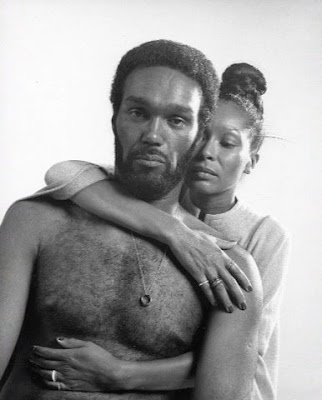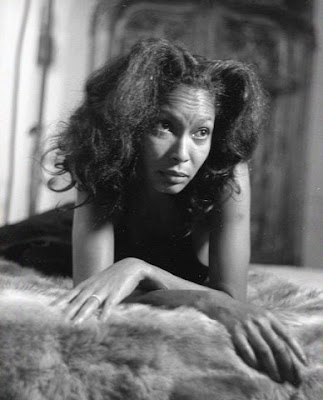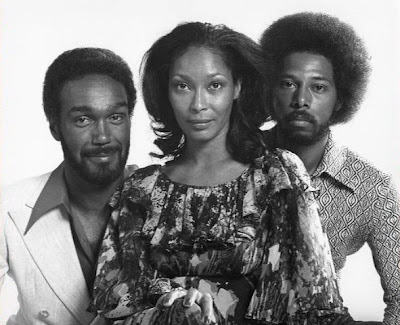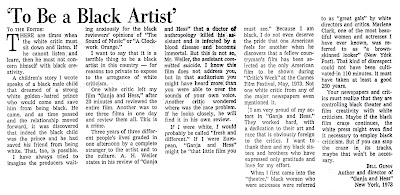
Much has been written about the damage inflicted upon GANJA AND HESS (1973), the fascinating, barely released vampire film that reunited the late writer-director Bill Gunn and actress Marlene Clark three years after Warner Brothers shelved their first collaboration, the x-rated erotic thriller STOP. “I loved working with Bill because he was so imaginative, creative and totally committed to the material,” Clark says. “GANJA AND HESS was his dream, his vision, and there wasn’t a thing he wouldn’t do to make it work. And in the process, he brought people together. Film crews had been traditionally all-white, yet here was a crew that was totally mixed -- and their devotion to Bill, and to what he was trying to say, was really quite impressive.”

Also impressive were the challenging roles Gunn wrote for Clark and her co-star, the late Duane Jones (from NIGHT OF THE LIVING DEAD). "You couldn’t wish for a better character,” the actress says of Ganja Meda, the mysterious woman who shares the curse of immortality and the thirst for human blood with Jones’ Dr. Hess Green. “There are so many levels to her personality. She’s such a collection of contradictions. Playing that part was very rewarding. And Duane was a treat to work with. He did a terrific job.”

GANJA AND HESS was the only American film screened during Critic’s Week at the 1973 Cannes Film Festival, where it was named one of the 10 Best American Film of the Decade. It opened at Manhattan’s Playboy Theater a few weeks later. “The first time I saw the movie was at the opening-night screening in New York,” Clark reveals. “There was a splashy party afterward -- and being the lead actress, I was pretty much the star of the party! Nothing like that had ever happened to me before. It was wonderful.” The bubble burst the next day, however, when almost every New York critic panned the film. “When I read the reviews, I thought, ‘They didn’t get it,’” Clark remembers. “Many critics believe that black people make very straightforward, literal movies -- so Bill was really an enigma to them. They just did not understand what he had done.”

Gunn’s unique cinematic treatment of African-American spirituality and vampirism was also lost on the film’s distributor, Kelly-Jordan Enterprises. After a one-week run in Manhattan, the original 110-minute version was pulled from circulation and replaced by a 76-minute bastardization called BLOOD COUPLE, with new credits listing “E.H. Novikov” (a pseudonym for film doctor Fima Noveck) as director. For nearly 25 years, it was this version that viewers were subjected to, both in theaters and on video, under such misleading titles as DOUBLE POSSESSION, BLACK EVIL, BLACK VAMPIRE, and BLACKOUT: THE MOMENT OF TERROR.

For their “Complete Edition” of GANJA & HESS, All Day Entertainment expands and improves upon their original DVD, which itself was a high watermark when released in 1998. Gunn’s one-of-a-kind film couldn’t get a drop of respect back in 1973, but for its 25th anniversary a decade ago All Day beautifully restored the cerebral bone-chiller to its full 110-minute glory. Well...almost. An MIA two-and-a-half minute scene found in Gunn’s own print but absent from all other sources has thankfully been reinstated. The extras from the first disc are present, including the extensive poster/still gallery and the informative audio commentary with Clark, producer Chiz Schultz, and director of photography James Hinton. Also returning, this time as a DVD-ROM feature, is the terrific essay by Tim Lucas and David Walker that explains the history of the film and the differences between Gunn’s cut and the 76-minute version by film doctor Fima Noveck. A new 30-minute featurette, “The Blood of the Thing,” consists of a recent interview with Schultz and film editor Victor Kanefsky peppered with Q&A footage of them (along with Hinton and assistant producer Janice Adams) at a New York screening. In “Ganja & Hess Reduced,” All Day’s David Kalat provides an 18-minute audio commentary for some of his favorite scenes. Gunn’s shooting script and a print interview with Noveck (conducted by Walker) round out the DVD-ROM extras on this excellent package.

Above: Bill Gunn


















4 comments:
I wonder what Bill Gunn would make of Jerry Lewis' BOY...
Great appreciation of the film.
I never could figure this film out. What's up with the church revival at the end?
I love this movie and dig that times letter! It's true, if this was European with subtitles, ala someting by Jean Rollin or Cocteau, it would be much more appreciated here in our racist ass country
Post a Comment